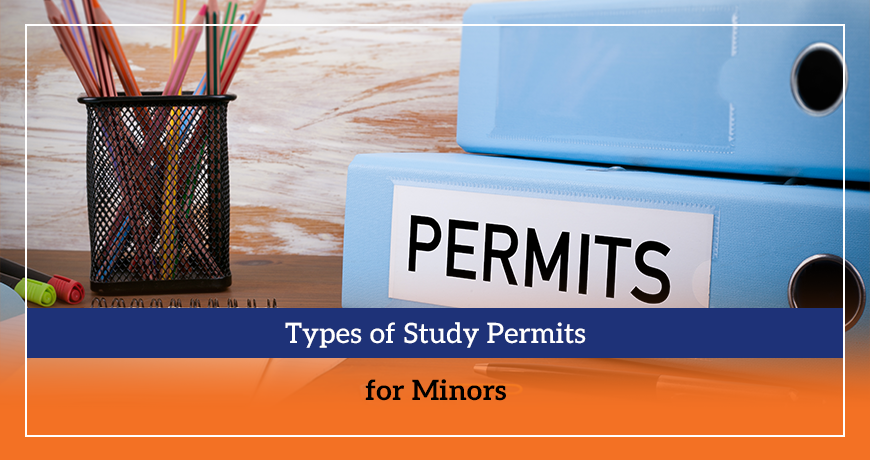
Dr Mohammad Shafiq
October 05 2024
Canada Minor Study Visa: Empowering Young Minds
Canada Minor Study Visa: Empowering Young Minds
Have you ever dreamed of exploring a new country while receiving a world-class education? Studying in Canada is a fantastic opportunity for minors seeking a unique and enriching experience. With its stunning landscapes, friendly people, and top-notch educational institutions, Canada offers young learners a welcoming and supportive environment.
Understanding the Canada minor study visa process is essential to ensure a smooth and successful study abroad journey. It specifically caters to minors who wish to pursue short-term academic programs in Canada. By knowing the requirements, documentation, and application procedures, you can confidently navigate the visa application process and maximise your study abroad adventure.
What is a Canada Minor Study Visa?
A Canada Minor Study Visa is a type of study permit specifically designed for international students under the age of majority, usually 18 or 19, depending on the province, who wish to pursue academic studies in Canada. This visa allows young students to experience the Canadian education system, explore new cultures, and gain valuable life skills.
Benefits for Young International Students
- Quality Education: Canada boasts world-renowned universities and colleges offering top-notch academic programs.
- Cultural Immersion: Living in Canada provides a unique opportunity to experience a different culture, make new friends, and develop global perspectives.
- Future Opportunities: A Canadian education can open doors to future studies, work, and immigration possibilities.
Eligibility Requirements
- Age Requirements: You must be under the age of majority in Canada.
- Enrollment in a DLI: You must be accepted into a Designated Learning Institution (DLI), a school approved by the Canadian government to host international students.
- Proof of Financial Support: You must demonstrate sufficient funds to cover your tuition fees, living expenses, and other costs. This might involve providing proof of financial support from parents, guardians, or scholarships.
- Guardianship: If you are under 18, you must provide evidence of guardianship. This could be a parent, legal guardian, or a designated custodian in Canada.

Types of Study Permits for Minors
Short-Term Study Permit
- Duration: This permit is suitable for programs less than six months long.
- Eligibility: A short-term study permit is appropriate if you plan to study in Canada for a short period, such as for a language course, a short-term internship, or a research project.
Key considerations for a short-term study permit
- Program Duration: Ensure that your program aligns with the maximum duration for a short-term permit.
- Financial Support: You will still need to provide proof of financial support to demonstrate your ability to cover your expenses during your stay.
- Guardianship: If you are under 18, guardianship arrangements remain essential.
Long-Term Study Permit
Duration: This permit is required for six months or longer programs.
Eligibility: You will need a long-term study permit if you intend to pursue a longer-term academic program in Canada, such as a high school diploma, a college degree, or a university degree.
Key considerations for a long-term study permit
- Program Duration: The permit will be issued for the duration of your approved program.
- Financial Support: You must provide substantial evidence of financial support to cover your tuition fees, living expenses, and other study costs.
- Guardianship: If you are under 18, guardianship arrangements are crucial. Your guardian will need to provide documentation to support their role.
Step-by-Step Guide to Applying for a Minor Study Visa
Preparing Necessary Documents
- Proof of Acceptance: You must get an acceptance letter from a Designated Learning Institution (DLI) in Canada. It will confirm your enrollment in a specific program.
- Custodianship Declaration Form: If you are under 18, you must submit a custodianship declaration form. This form outlines the arrangements for your care and supervision while in Canada.
- Proof of Financial Support: Provide evidence of sufficient funds to cover your tuition fees, living expenses, and other costs. This might include bank statements, proof of scholarships, or letters of financial support from parents or guardians.
Application Process
- Online Application: Visit the Immigration, Refugees and Citizenship Canada (IRCC) website and start your online application.
- Complete the Application Form: Now, fill out the application form correctly. You will have to provide all the necessary documents with the application form.
- Submit Biometrics: You may need to visit a visa application centre to submit your biometrics (fingerprints and photographs) if required.
- Pay Fees: Pay the applicable visa application fees.
- Submit Supporting Documents: Upload or submit the required documents as instructed.
Canada Minor Study Visa Processing Times
Minor visa processing times for study permits in Canada can vary based on factors such as the volume of applications and the complexity of your case. It is recommended that you apply early to allow sufficient time for processing.

Custodianship and Guardianship Requirements
What is Custodianship?
Custodianship is a legal arrangement where a designated person, a custodian, is responsible for a minor's care, supervision, and well-being in a foreign country. Custodianship is often required for minors travelling or studying abroad without their parents or legal guardians.
Difference Between Custodian and Guardian
- Guardian: A guardian is typically a parent or legal guardian with permanent custody of a minor. They have broader legal responsibilities and rights, including making decisions about the minor's education, healthcare, and personal matters.
- Custodian: A custodian is a designated person who temporarily takes responsibility for a minor's well-being while they are in a specific location, such as another country. Their responsibilities are more limited in scope.
How to Appoint a Custodian
To appoint a custodian, you must typically provide a custodianship declaration form to the relevant immigration authorities. This form outlines the details of the custodianship arrangement, including the custodian's identity, the duration of the arrangement, and the scope of the custodian's responsibilities.
Responsibilities of a Custodian
A custodian's responsibilities may include:
- Ensuring the minor's safety and well-being
- Providing accommodation and meals
- Assisting with academic matters
- Managing the minor's finances
- Providing medical care if necessary
- Representing the minor in legal matters (if required)
Custodian vs. Guardian: A Comparison
|
Feature
|
Custodian
|
Guardian
|
|
Role
|
Temporary caretaker
|
Primary caregiver
|
|
Responsibilities
|
Limited to a specific location
|
Broad legal rights and responsibilities
|
|
Legal Implications
|
Less extensive
|
More extensive
|
|
Appointment
|
Through a declaration form
|
Usually established by law or court order
|
Costs and Financial Considerations
Visa Application Fees
- Government Fees: As of 2024, the government fee for a study permit application is CAD 755.
- Biometric Fees: If required, the biometric fee is CAD 85.
Tuition Fees and Living Expenses
Tuition fees and living expenses can vary significantly depending on the province, the type of institution, and the program you choose.
Estimated Costs by Province:
|
Province
|
Estimated Annual Tuition Fees (CAD)
|
Estimated Annual Living Expenses (CAD)
|
|
Ontario
|
20,000 - 35,000
|
15,000 - 25,000
|
|
British Columbia
|
18,000 - 30,000
|
14,000 - 22,000
|
|
Quebec
|
10,000 - 25,000 (for international students)
|
15,000 - 25,000
|
|
Alberta
|
15,000 - 28,000
|
13,000 - 20,000
|
Additional Costs:
- Health Insurance: The cost of health insurance can vary depending on the provider and coverage. You can expect to pay around CAD 700 - 1,500 per year.
- School Supplies: Budget for textbooks, stationery, and other necessary supplies, which could cost around CAD 1,000 - 2,000 per year.
- Transportation: Consider transportation costs, such as public transit or car ownership.
- Personal Expenses: Allow for personal expenses like entertainment, clothing, and dining out.
Scholarships and Financial Aid
Many Canadian universities and colleges offer scholarships and financial aid programs specifically for international students to help minimize the cost of tuition and living expenses.
Available Options:
- Merit-Based Scholarships: Awarded based on academic achievements or other criteria.
- Need-Based Scholarships: For students who are meritorious but require financial assistance.
- Government Scholarships: Offered by various governments and organizations.
- University-Specific Scholarships: Scholarships offered directly by Canadian universities and colleges.
Researching and applying for scholarships early in the application process is important. Additionally, explore the financial aid options available through your home country or international organizations.
Financial Planning Tips:
- Create a Budget: Develop a detailed budget to estimate your overall expenses.
- Save in Advance: Start saving money well to cover your upfront costs.
- Explore Financing Options: Consider education loans or other financing options if necessary.
- Seek Financial Advice: Consult a financial advisor or your home country's education counselling services for personalised guidance.

Living in Canada as a Minor Student
Accommodation Options
- Homestay Programs: Living with a Canadian family can provide a more immersive cultural experience and offer support and guidance.
- Dormitories: Living in university or college dormitories can be a great way to meet other international students and experience campus life.
Finding the Right Living Arrangement:
- Research Options: Explore the different accommodation options available at your chosen institution.
- Consider Your Preferences: When deciding, consider your lifestyle, budget, and desired level of independence.
- Talk to Other Students: Ask current students for their recommendations and experiences.
Health Insurance Requirements
- Coverage Details: International students are generally required to have health insurance coverage. Different provinces have different coverage requirements.
- How to Obtain Insurance: You can obtain health insurance through your home country, purchase a private plan from a Canadian insurer, or enrol in a provincial health insurance plan.
Cultural Adjustment and Support
- Resources and Support Services: Canadian universities and colleges often offer resources and support services for international students, including counselling, language assistance, and cultural orientation programs.
- Connect with Other Students: Building relationships with international students can help you adjust to the Canadian culture and feel more at home.
- Explore the Community: Get involved in campus activities and explore the local community to meet new people and learn about Canadian customs.
Study Permit vs. Minor Study Visa: Understanding the Difference
Study Permit
A study permit is a general document that allows foreign nationals to study in Canada for a specific period. It can be used by students of all ages, including minors.
Minor Study Visa
A minor study visa is a specific type of study permit designed for international students under the age of majority in Canada. It offers additional considerations and requirements tailored to the needs of younger students.
Comparison Table
|
Feature
|
Study Permit
|
Minor Study Visa
|
|
Eligibility
|
All ages
|
Minors (under 18 or 19)
|
|
Requirements
|
Proof of acceptance, financial support, etc.
|
Same as a study permit, plus guardianship arrangements
|
|
Application Process
|
Generally similar
|
May have specific requirements for minors, such as custodianship
|
|
Purpose
|
To study in Canada for any duration
|
To study in Canada for minors
|

Legal and Safety Considerations
Legal Rights and Responsibilities
As a minor studying in Canada, it's essential to understand your legal rights and responsibilities. While Canadian laws may differ slightly from those in your home country, you are generally entitled to the same basic human rights.
- Child Protection Laws: Canada has strong child protection laws to safeguard minors' rights and well-being.
- Educational Rights: You have the right to a quality education and protection from discrimination.
- Consumer Rights: You are entitled to consumer protection laws, ensuring fair treatment in your interactions with businesses and services.
Safety Tips
- Familiarize Yourself with Your Surroundings: Learn about your local community and be aware of your surroundings.
- Avoid Isolated Areas: Be cautious when walking alone, especially at night. Stick to well-lit and populated areas.
- Personal Safety Tips: Practice basic personal safety measures, such as not accepting rides from strangers and being mindful of your belongings.
- Emergency Contacts: Keep emergency contact information readily available, including the numbers for local police, fire departments, and hospitals.
- Cultural Sensitivity: Be aware of cultural differences and avoid any actions that may be considered disrespectful or offensive.
Frequently Asked Questions
Do minors need a study permit to study in Canada?
Yes, minors need a study permit to study in Canada.
How long does it take to process a minor study visa?
Processing times for minor study visas can vary, but it is generally recommended that you apply well before your planned travel date.
Can a minor study visa be extended?
Yes, a minor study visa can be extended if your program continues beyond the initial duration of the permit.
What happens if a minor violates visa conditions?
If a minor violates the conditions of their study permit, they may face consequences, including deportation or restrictions on future travel. Adhere to all visa requirements and regulations.
Conclusion
In conclusion, obtaining a Canada minor study visa offers young international students a unique and rewarding opportunity. Remember to start your application early to allow sufficient time for processing. For further information and guidance, consult the official Immigration, Refugees and Citizenship Canada (IRCC) website or contact the Canadian embassy or consulate in your home country.







